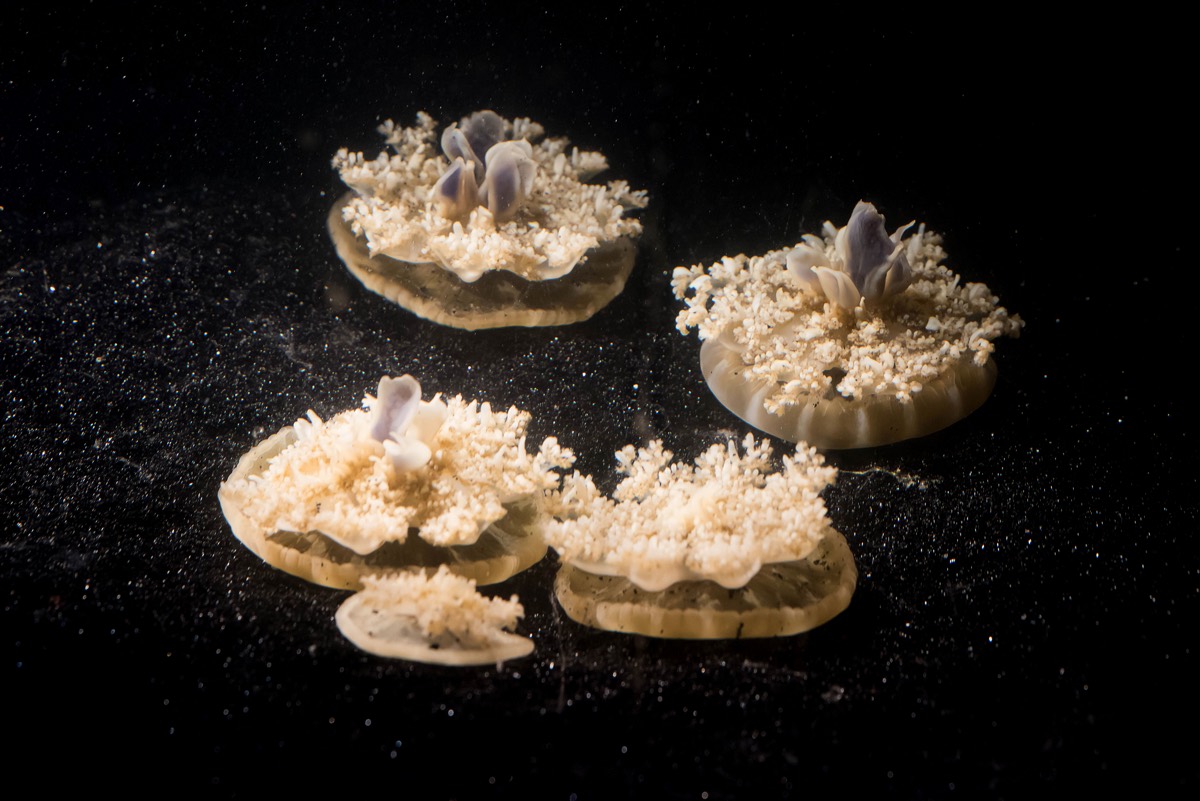Jellyfish Don't Have Brains, But They Do Sleep
Get the world’s most fascinating discoveries delivered straight to your inbox.
You are now subscribed
Your newsletter sign-up was successful
Want to add more newsletters?

Delivered Daily
Daily Newsletter
Sign up for the latest discoveries, groundbreaking research and fascinating breakthroughs that impact you and the wider world direct to your inbox.

Once a week
Life's Little Mysteries
Feed your curiosity with an exclusive mystery every week, solved with science and delivered direct to your inbox before it's seen anywhere else.

Once a week
How It Works
Sign up to our free science & technology newsletter for your weekly fix of fascinating articles, quick quizzes, amazing images, and more

Delivered daily
Space.com Newsletter
Breaking space news, the latest updates on rocket launches, skywatching events and more!

Once a month
Watch This Space
Sign up to our monthly entertainment newsletter to keep up with all our coverage of the latest sci-fi and space movies, tv shows, games and books.

Once a week
Night Sky This Week
Discover this week's must-see night sky events, moon phases, and stunning astrophotos. Sign up for our skywatching newsletter and explore the universe with us!
Join the club
Get full access to premium articles, exclusive features and a growing list of member rewards.
They don't have brains, or even anything more than a rudimentary nervous system, but jellyfish apparently do have bedtimes.
New research finds that jellyfish enter a sleep-like state. If the study, published today (Sept. 21) in the journal Current Biology, is confirmed by future studies, jellyfish are the first-ever animals with no central nervous system to have been observed sleeping. That finding could bolster the theory that sleep is an emergent property of neurons — in other words, sleep might be something that nerve cells connected in a network just do, even without complex organization.
"The real novelty of what we've shown is that this animal that is almost as far away, evolutionarily, from humans and higher animals as you can go, also seems to have this conserved behavioral state" of sleep, said study co-author Claire Bedbrook, a doctoral student in bioengineering at the California Institute of Technology. [See Adorable Photos of Animals Sleeping]
The origins of sleep
Sleep is crucial to survival, but no one knows exactly what it does or why it first evolved. A 1995 study in the journal Behavioural Brain Research found that when deprived of sleep completely, rats died within three weeks. Animals as simple as the worm Caenorhabditis elegans, which has just 302 neurons and an extremely simple central nervous system, have been found to exhibit patterns of activity and rest that look an awful lot like sleep.
Ravi Nath, a Caltech graduate student and a co-author of the new study, typically studies this sleep-like state in C. elegans. He and his lab adviser, Paul Sternberg, wondered if they could find evidence of sleep in even simpler animals. Jellyfish came to mind, Nath told Live Science.
Another Caltech graduate student, Michael Abrams, happened to be cultivating jellyfish in the lab of biologist Lea Goentoro at the same time for an entirely unrelated project. He noticed that one genus, Cassiopea, or the upside-down jellyfish, seemed to become less active at night. Cassiopea spends the vast majority of its time sitting upside down on the ocean or tank floor, pulsing its bell about once a second, Abrams told Live Science. This sedentary behavior makes the upside-down jellyfish an easy animal to track behaviorally.
Snoozing jellies
Abrams and Nath joined forces with Bedbrook to investigate just what the jellies were doing. They knew that to show that the jellyfish were sleeping, they'd have to prove that their behavior met the standard criteria for sleep: decreased activity that is rapidly reversible, unlike a coma or unconsciousness; reduced responsiveness to stimuli compared to a waking state; and homeostatic regulation, meaning there is some sort of innate "drive" toward sleep and that the animal needs sleep to function. [10 Things You Didn't Know About the Brain]
Get the world’s most fascinating discoveries delivered straight to your inbox.
To measure activity, the researchers counted the rate of the bell's pulsation in 23 jellyfish for six straight days and nights. They found that the rate dropped by 32 percent at night, going from about 1,155 pulses per 20 minutes during the day to 781 pulses per 20 minutes at night. When the researchers put a little midnight snack in the water column, the jellies perked up and started pulsing at daytime rates, indicating that this quiescent period was easily reversible.
But were the jellyfish less responsive than usual? To find out, the researchers put the jellyfish into small containers made of PVC pipe with a mesh bottom. They raised the jellies gently up from the bottom of the tank, then rapidly yanked the container downward, leaving the jellyfish suspended in the water.
Cassiopea jellies prefer sitting to swimming, so the suspended jellies pulsed their way down to the tank floor. But they did so much faster during the day, starting to pulse by 2 seconds after losing their resting surface, than they did at night, when it took them about 6 seconds to start pulsing — almost as if they were groggily shaking off sleep before they could react.
Next, the researchers tested whether the sleepy behavior in jellyfish was under homeostatic control. Put more simply, the question was: Would jellies act tired the next day if they were deprived of their quiescence at night? To find out, the researchers blew gentle pulses of water at the jellies for 10 seconds every 20 minutes. They found that when they disturbed the jellyfish this way during the last 6 hours of the night, the jellyfish showed a 12 percent decline in pulsing in the first 4 hours of the next day, as if they were having trouble waking up. When the researchers continued the disturbances all night, the jellyfish were 17 percent less active over the entire next day. After a full night without any disturbances, the jellyfish returned to normal activity levels the following day.
Evolution of sleep
One burning question is whether the sleep-like behavior in jellyfish is the same kind of behavior that eventually gave rise to the complex sleep of higher animals. Researchers do know that the same genes and molecules that control sleep in worms and flies also regulate sleep in zebrafish and humans, Nath said. The researchers weren't able to look for those genes and molecules in this study, but they did dose the jellyfish's water with melatonin and the antihistamine pyrilamine, two substances that make humans drowsy. The jellyfish, too, became less active in the presence of these substances, suggesting that the sleep state in the oldest known animals and in humans might have the same biological roots.
"If this is something that is conserved in what we observe in other invertebrates, vertebrates or humans, then what is the common denominator?" Bedbrook said. "What do they all have in common that could be the reason these animals go through this sleep state?"
The next step, Nath said, might be to use electrodes to track the activity of the jellyfish's neurons during the sleep-like state.
"We'd love to see whether there are other species of jellyfish that also sleep," Bedbrook added. "We would also like to see whether or not sponges, the next level down, sleep." Sponges don't have nervous systems at all, though they do possess some of the rudimentary genes and proteins found in other animals' nervous systems.
Original article on Live Science.

Stephanie Pappas is a contributing writer for Live Science, covering topics ranging from geoscience to archaeology to the human brain and behavior. She was previously a senior writer for Live Science but is now a freelancer based in Denver, Colorado, and regularly contributes to Scientific American and The Monitor, the monthly magazine of the American Psychological Association. Stephanie received a bachelor's degree in psychology from the University of South Carolina and a graduate certificate in science communication from the University of California, Santa Cruz.
 Live Science Plus
Live Science Plus











